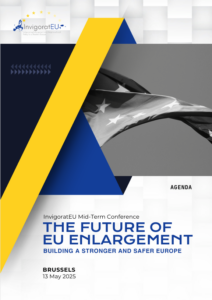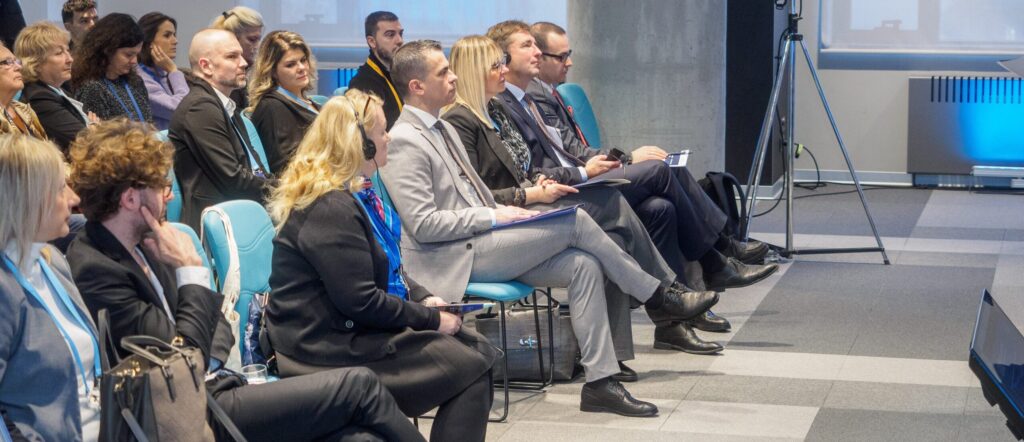Headquarters: Svetog Nauma 7, 11000
Office address: Đorđa Vajferta 13, 11000
Phone:: +381 11 4529 323

12 December 2023 – Today, the conference within the project Circular Migration before Depopulation! Innovative solutions to spark circular migration as a pillar of enhanced competitiveness and economic development was organised by the European Policy Centre (CEP) and the Foundation for the Advancement of Economics (FREN).
The conference gathered over twenty speakers in four panels and more than 70 representatives of civil society, academia, circular migrants themselves and representatives of government decision-makers.

Opening speeches were given by Đorđe Milićević, the Minister without portfolio in charge of coordinating activities and measures in the field of relations between the Republic of Serbia and the diaspora, Martin Klaucke, Head of Operations II at the Delegation of the European Union in Serbia, , prof. dr. Dejan Molnar Director of FREN, and Ranka Miljenović, Executive Director of CEP.
“The topic of circular migration is here to stay. According to the latest census, many municipalities in Serbia witnessed a decrease in population, which requires implementing measures to tackle this issue, ” said Klaucke.
Milićević pointed out that Serbia must work to make the diaspora “feel like our compatriots” and that the ties between the mother country and the diaspora should be further strengthened.

Molnar referred to the facts and data collected by FREN and CEP during the project and pointed out that the quality of human capital leads to economic growth.
“We tried to draw relevant conclusions based on data and facts that will help decision-makers and draw the public’s attention. Serbia lost 850 thousand inhabitants between the two censuses, and most of the people who left are from rural settlements, which indicates the necessity to focus on this problem.“
In continuation of the opening remarks, Miljenović emphasised the importance of discussions on circular migration and the involvement of all parts of Serbian society.
“When we started working on this project two years ago, we were aware that this topic had been neglected, so during the project, we talked about the problem of migration, first of all, with citizens of all age groups and educational profiles, representatives of city institutions from all over Serbia, representatives of CSOs, activists and associations, authorities at the central level, colleagues from the EU and the circular migrants themselves, as well as with the media “, said Miljenović.
The four panels discussed various aspects of the topic of circular migration and the impact of circular migration on economic and social conditions. The topics covered by the panel shed light on how countries and societies across Europe can benefit from understanding and managing circular migration If properly addressed.
The first panel’s topic was a comparison of practices in circular migration in Serbia and Europe. During the project, the researchers analysed the example of three European countries and their way of fighting the problem of migration: Estonia, Bulgaria and Ireland.

Kaire Cocker, from the Integration Foundation of the Government of Estonia, presented the example of Estonia as one of the most successful countries in attracting emigration. She also presented some of the significant campaigns carried out by Estonia, which resulted in about 7000 Estonian citizens returning to the country.
Uroš Živković, Programme Director of Returning Point, pointed out that since 2020, the Returning Point has been actively dealing with measures to combat depopulation and that a good practical example is Carta Serbica – an initiative to enable dozens of people who cannot have dual citizenship to obtain the right to temporary stay and work in Serbia based on Serbian origin.
After that, in the second panel, the panellists explored labour market opportunities for circular migrants and examined ways in which circular migration could serve as an instrument to address labour market imbalances and consequently stimulate economic growth.
Miloš Turinski, PR manager of the employment group from Infostud, described the current situation, pointing out that Serbia has had a labour deficit since 2014, that the deficit is increasing and that artisans, drivers and construction workers are most in demand.
“We can’t reverse the attrition trend, but we can work to keep as many people as possible,” Turinski said.
Also, Aleksandra Lakićević, Deputy head of the global programme “Migration for Development” and “Migration and Diaspora” in Serbia, indicated that GIZ monitors events in the country and that data-based advocacy has been part of their approach since 2015.
Danijela Bobić Tasić, Economic Development Specialist from UNDP in Serbia, emphasised that it is necessary to change the narrative from “give more births” to creating different working conditions for people who are already here and are actively looking for work, and in this way to solve the problem of lack of workforce and attracting young people to certain industries.

“Migrations are not such that only the smartest leave, but everyone according to the structure of the population, but a certain number of people do return – we must work to see why they return and to see how there can be as many people of them as possible.”
The topic of the third panel was an investigation of the situation on the spot: local civil society organisations transformed into regional centres of excellence (ReCeEx) during the previous year and spoke about their challenges and experiences in the fight against emigration and encouraging circular migration. ReCeEx representatives shared the challenges that are characteristic of their region.
The representative of ReCeEx for central Serbia, Dragan Roganović, from the Ibar Development Association (IDA), said that in central Serbia, the solution is networking small communities and establishing local action groups.
Srđan Vlaškalić, Executive Director and Founder of the Sombor Educational Centre, ReCeEx for the northern part of Serbia, drew attention to the fact that the civil sector is a significant resource regarding circular migration and circular migration and migration management.

“It is necessary to encourage the promotion and development potential of the region, as well as decentralisation within the state and the region. It is also extremely important to provide investment advice and support to organisations and circular migrants.”
At the conference’s last panel, the panellists, who are also circular migrants, shared their personal and professional experiences of what it’s like to be and work as a circular migrant and the advantages and disadvantages of such a way of life. At this, the audience could hear and understand firsthand the real impact of circular migration on individuals and communities.
Una Stupar Jokić, the strategic designer and entrepreneur, talked about her and professional journey, how she returned to Serbia twice from different parts of the world, the United States of America, Italy, and Switzerland, for different reasons, but her decision turned out to be a good one in the end.
“My family and I, as circular migrants, let life drive us. We don’t have a long-term plan anymore,” said Una.
Miroslav Terzić, movie director, shared his experience of leaving the country and the circumstances that made him a circular migrant.
“I left Serbia to do a commercial, and since 2012, I have been travelling and working in Europe. Moving, of course, depends on circumstances, and extreme circumstances such as wars in the former Yugoslavia and Brexit in the UK encourage quick decisions on migration.”

A lecturer at several universities in Europe and Serbia, Lazar Džamić, pointed out that the term circular migrant often has a negative connotation.
“The term circular migration often has a negative connotation because migration is mostly associated with negative migration. I prefer the term: circular intellectual capital.”
Circular migrant and doctoral student at the University of Cambridge, Vukan Marković, as a current circular migrant, shared his experience of how he maintains his status and how modern technologies, lifestyle and the benefits of his position help him in this.
“It is possible to maintain the position of a circular migrant, i.e. life and work abroad and ties with Serbia. Today, it is faster to get to London from Belgrade than to Novi Pazar, and precisely because of this, the connection between people and circular migrants has never been faster and easier.”
The conference was closed by prof. dr. Jelena Žarković from the FREN, who thanked the participants and wished that the discussion on this topic would continue in the future.